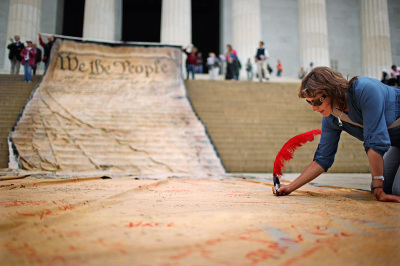Is the Constitution dangerous?

Is the Constitution hazardous to our nation? According to the New York Times it is. At least, that’s what the Times’ book critic Jennifer Szalai postulates in her recent article, “The Constitution Is Sacred. Is It Also Dangerous?”
She writes, “Americans have long assumed that the Constitution could save us; a growing chorus now wonders whether we need to be saved from it.”
She writes of Trump’s presidential victory in 2016 as Exhibit #1: “Trump owes his political ascent to the Constitution, making him a beneficiary of a document that is essentially antidemocratic and, in this day and age, increasingly dysfunctional.”
And she continues, “After all, Trump became president in 2016 after losing the popular vote but winning the Electoral College (Article II). He appointed three justices to the Supreme Court (Article III), two of whom were confirmed by senators representing just 44% of the population (Article I). Those three justices helped overturn Roe v. Wade, a reversal with which most Americans disagreed.”
Once again, the left takes out its big guns against the Electoral College. But they seem to lack a basic understanding of American Civics 101. By design, the founders did not give us a pure democracy — which they viewed as dangerous, potentially leading to mobocracy.
The Constitution empowers “we the people” through our elected representatives. Article II, Section 1, Clause 2 of the Constitution deals with the electoral process. To sum it up: We don’t directly elect the president, but we vote for those who do. In all this, the Constitution provides a layer of protection — sparing us from would-be tyrants.
In my Providence Forum documentary on the Constitution, “We The People,” guest Dennis Prager of PragerU remarks: “The Electoral College was a brilliant innovation of the founders, because they didn’t want a democracy, they wanted a republic. ‘… and to the republic for which it stands.’ It’s in the Pledge of Allegiance. This is a republic. And it’s not a pure democracy, So, there’s a check on the popular vote by the states, and that’s why they have the Electoral College.”
James Madison, a key architect of the Constitution, notes in Federalist #10 that we have a republic, not a “pure democracy,” which “can admit of no cure for the mischiefs of faction.”
Without the Electoral College, the big cities and big states would always determine who would become the president. The Constitution thus protects the interests of those in the minority, who live in less populous states and cities. Small towns in Vermont were never meant to be ruled by majorities from California.
Tara Ross is the author of The Indispensable Electoral College: How the Founders’ Plan Saves Our Country from Mob Rule and Enlightened Democracy: The Case for the Electoral College.
She once told me, “Our Constitution creates a government that is a blend of democracy (self-governance), republicanism (deliberation and compromise), and federalism (national versus state authority) because our Founders sought to ensure that the American government reflects all voices, despite our diversity and despite the varying sizes of our states. The Electoral College is a reflection of these principles and simply ensures that large states and urban areas don’t tyrannize the rest of the country when it comes to selection of the President.”
The framers gave us a very stable government, built on our two key founding documents, the Declaration of Independence which says our rights come from God and are therefore inalienable, and the Constitution, which explains how this government is supposed to work. Both documents reflect a strong Judeo-Christian worldview.
The Constitution is predicated on the notion that human beings are sinful. The Scriptures repeatedly refer to man’s sinful nature. As the late Dr. Walter Williams, professor at George Mason University, noted in our documentary: “The founders did not believe in the goodness of mankind. That is, they say men were not angels, and this is why we need government.”
Indeed, Madison argued in Federalist #51: “If angels were to govern men, neither external nor internal controls on government would be necessary. In framing a government which is to be administered by men over men, the great difficulty lies in this: you must first enable the government to control the governed: and in the next place oblige it to control itself.”
Since 1787, while many nations have undergone revolutions and tempestuous changes and different governing documents, our country under the Constitution has endured because it’s based on a realistic assessment of man’s base nature.
To obliterate the Constitution would be like obliterating a strong dam — potentially unleashing rushing floodwaters of death and destruction. Those who want to change the Constitution don’t realize the kinds of evil and mayhem they could end up ushering in. History is filled with examples that showcase the law of unintended consequences.
Jerry Newcombe, D.Min., is the executive director of the Providence Forum, an outreach of D. James Kennedy Ministries, where Jerry also serves as senior producer and an on-air host. He has written/co-written 33 books, including George Washington’s Sacred Fire (with Providence Forum founder Peter Lillback, Ph.D.) and What If Jesus Had Never Been Born? (with D. James Kennedy, Ph.D.). www.djkm.org? @newcombejerry www.jerrynewcombe.com




























